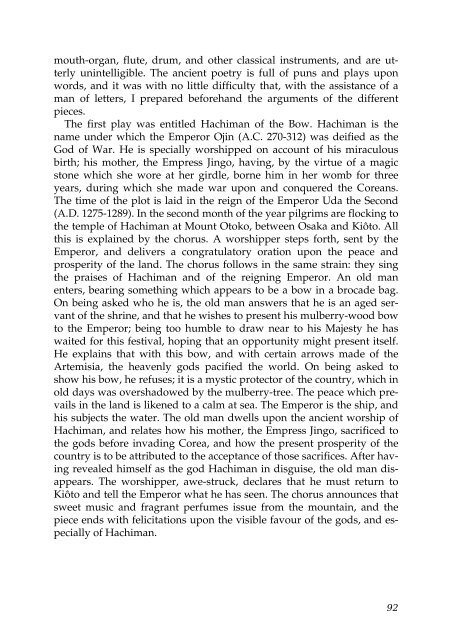Create successful ePaper yourself
Turn your PDF publications into a flip-book with our unique Google optimized e-Paper software.
mouth-organ, flute, drum, and other classical instruments, and are utterly<br />
unintelligible. The ancient poetry is full <strong>of</strong> puns and plays upon<br />
words, and it was with no little difficulty that, with the assistance <strong>of</strong> a<br />
man <strong>of</strong> letters, I prepared beforehand the arguments <strong>of</strong> the different<br />
pieces.<br />
The first play was entitled Hachiman <strong>of</strong> the Bow. Hachiman is the<br />
name under which the Emperor Ojin (A.C. 270-312) was deified as the<br />
God <strong>of</strong> War. He is specially worshipped on account <strong>of</strong> his miraculous<br />
birth; his mother, the Empress Jingo, having, by the virtue <strong>of</strong> a magic<br />
stone which she wore at her girdle, borne him in her womb for three<br />
years, during which she made war upon and conquered the Coreans.<br />
The time <strong>of</strong> the plot is laid in the reign <strong>of</strong> the Emperor Uda the Second<br />
(A.D. 1275-1289). In the second month <strong>of</strong> the year pilgrims are flocking to<br />
the temple <strong>of</strong> Hachiman at Mount Otoko, between Osaka and Kiôto. All<br />
this is explained by the chorus. A worshipper steps forth, sent by the<br />
Emperor, and delivers a congratulatory oration upon the peace and<br />
prosperity <strong>of</strong> the land. The chorus follows in the same strain: they sing<br />
the praises <strong>of</strong> Hachiman and <strong>of</strong> the reigning Emperor. An old man<br />
enters, bearing something which appears to be a bow in a brocade bag.<br />
On being asked who he is, the old man answers that he is an aged servant<br />
<strong>of</strong> the shrine, and that he wishes to present his mulberry-wood bow<br />
to the Emperor; being too humble to draw near to his Majesty he has<br />
waited for this festival, hoping that an opportunity might present itself.<br />
He explains that with this bow, and with certain arrows made <strong>of</strong> the<br />
Artemisia, the heavenly gods pacified the world. On being asked to<br />
show his bow, he refuses; it is a mystic protector <strong>of</strong> the country, which in<br />
old days was overshadowed by the mulberry-tree. The peace which prevails<br />
in the land is likened to a calm at sea. The Emperor is the ship, and<br />
his subjects the water. The old man dwells upon the ancient worship <strong>of</strong><br />
Hachiman, and relates how his mother, the Empress Jingo, sacrificed to<br />
the gods before invading Corea, and how the present prosperity <strong>of</strong> the<br />
country is to be attributed to the acceptance <strong>of</strong> those sacrifices. After having<br />
revealed himself as the god Hachiman in disguise, the old man disappears.<br />
The worshipper, awe-struck, declares that he must return to<br />
Kiôto and tell the Emperor what he has seen. The chorus announces that<br />
sweet music and fragrant perfumes issue from the mountain, and the<br />
piece ends with felicitations upon the visible favour <strong>of</strong> the gods, and especially<br />
<strong>of</strong> Hachiman.<br />
92



